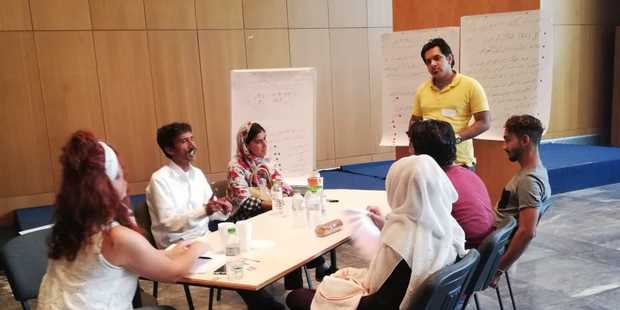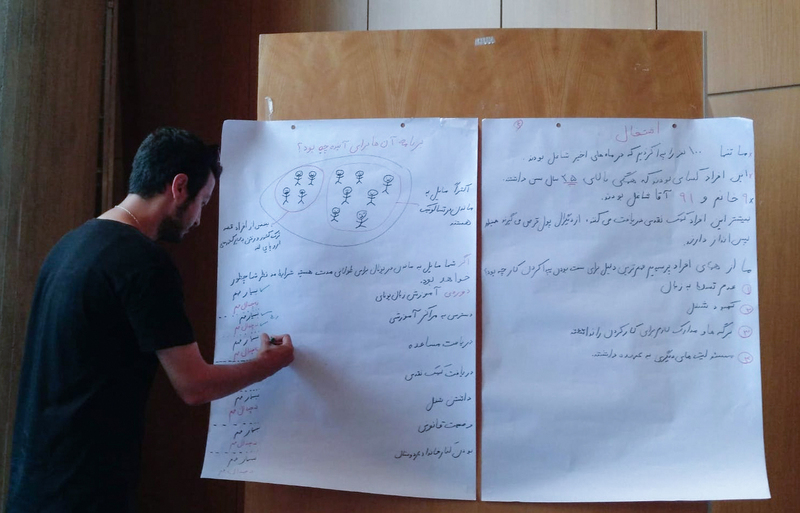With the data collection phase recently concluded and the data analysis just about to start, the urban profiling exercise we have been supporting in Thessaloniki is now in its final stage. With a general objective to develop and test indicators for urban, local integration, to analyse future intentions and to assess access to services by refugees, asylum seekers and persons with an irregular status, it is expected to help to inform urban integration strategies and municipal planning for service delivery.
In the past few days, our colleagues Margharita Lundkvist-Houndoumadi, Kari Fyhn and Svend-Jonas Schelhorn have been conducting a series of consultations with groups of displaced populations involved in the Thessaloniki profiling exercise. Community engagement has always been a strong component of this exercise from the very beginning. During the development phase of indicators for local integration, consultations were held with asylum seekers and irregular migrants to better understand how local integration is perceived and experienced from their perspectives.
This article is part of our series on community engagement in profiling, which looks at both specific country contexts (such as Sudan and Honduras) and our efforts to improve our practices overall.

Intended as a way to both report profiling findings back to communities and receive useful feedback on key findings, community consultations involved participants from each of the three groups included in the exercise (namely refugees, asylum seekers and persons with an irregular status, living in and around Thessaloniki). Preliminary results from the survey were presented to the consultation participants, mainly through visual methods and key statements, who then were asked to discuss and interpret these. This allowed us to “ground-truth” or validate results and, when relevant, brainstorm on potential solutions. Additionally, the community consultations also resulted in the creation of recommendations from participants on how the final profiling results should be shared with the displaced groups.
The community consultations also helped us in our effort to mainstream a community engagement strategy into profiling activities, especially the 6 principles on meaningfully engaging with communities, and to further refine FGD methodologies with visual methods to show survey results and interactively validate results.
For example, although the initial plan envisaged a consultation with persons of irregular status, during the training with the consultation facilitators it became clear that the risks and effort to involve this group outweighed the value of discussing and validating findings of the survey with them. Hence, by acting upon the principle of “conflict sensitivity and do no harm”, this consultation was cancelled. Instead, a separate validation workshop with enumerators was organized which allowed a rich discussion around the contextualization of the survey findings.
The consultations also entailed a short discussion with feedback on the consultations themselves, with participants highlighting how important and acknowledging it was to be able to share their concerns.
Once consolidated, the results of the consultations were presented, along with recommendations, to the key profiling partners and stakeholders at the joint analysis workshop, in order to ensure that decisions on how to further conduct data analysis would incorporate local realities and displaced populations’ perspectives.
One of the most important lessons learned from this exercise was that involving a dedicated local community of practice as enumerators, consultation and FGD facilitators, note takers and interpreters, and “using” their strong understanding of the context and familiarity with communities, can be extremely beneficial.
A whole day of intensive training was scheduled with the group of community consultation facilitators and note takers. The training was set up in a way that allowed for mutual learning from experiences, translation of the visual methods into the relevant languages and discussion of best practices for note taking and facilitation.
Facilitators’ familiarity and trust relation with surveyed communities proved particularly important as it allowed for an inclusive “listening” approach, in which all voices could be heard – female and male; with different migration histories and different future hopes. In addition, face-to-face debriefs with facilitators and note takers took place after each consultation, which allowed for further exploration of topics that seemed too sensitive for a group discussion.

Previous examples of community participation and validation in Myanmar had given us a great example of the added value of involving communities in the profiling process. However, every context comes with specific challenges and difficulties, and if some general principles on community engagement can be identified, these will still need to be adjusted to different contextual specificities.
In a recent chat with Knut Maehlumshagen, Profiling Coordinator of the Thessaloniki exercise, we learnt about some of the elements that slowed down the process, including the strong diversity within the displaced populations covered by the exercise, the many different languages spoken and the very dissimilar accommodation types people were living in.
For us at JIPS, these consultations represented a great way to further test community engagement principles, understand how they fit into different situations and how they can be improved. To this end, as the data analysis process progresses, our colleagues will be working on developing a report on lessons learned and future recommendations for monitoring and evaluating community engagement activities.